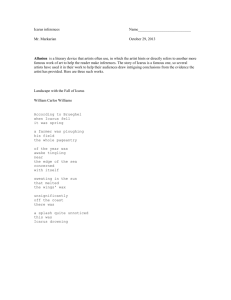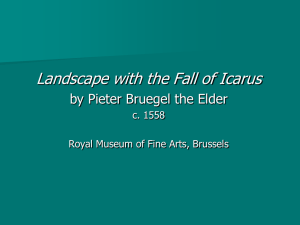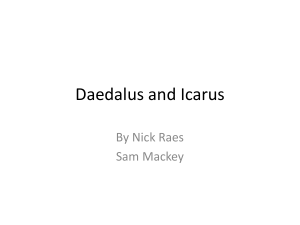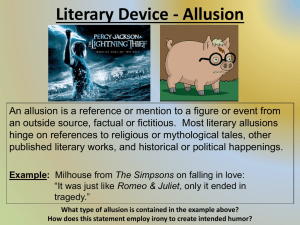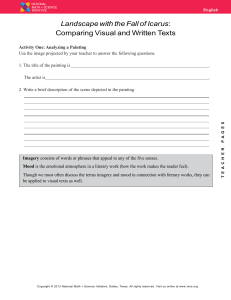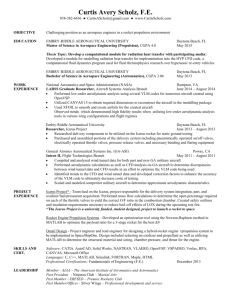Icarus - TeacherWeb
advertisement
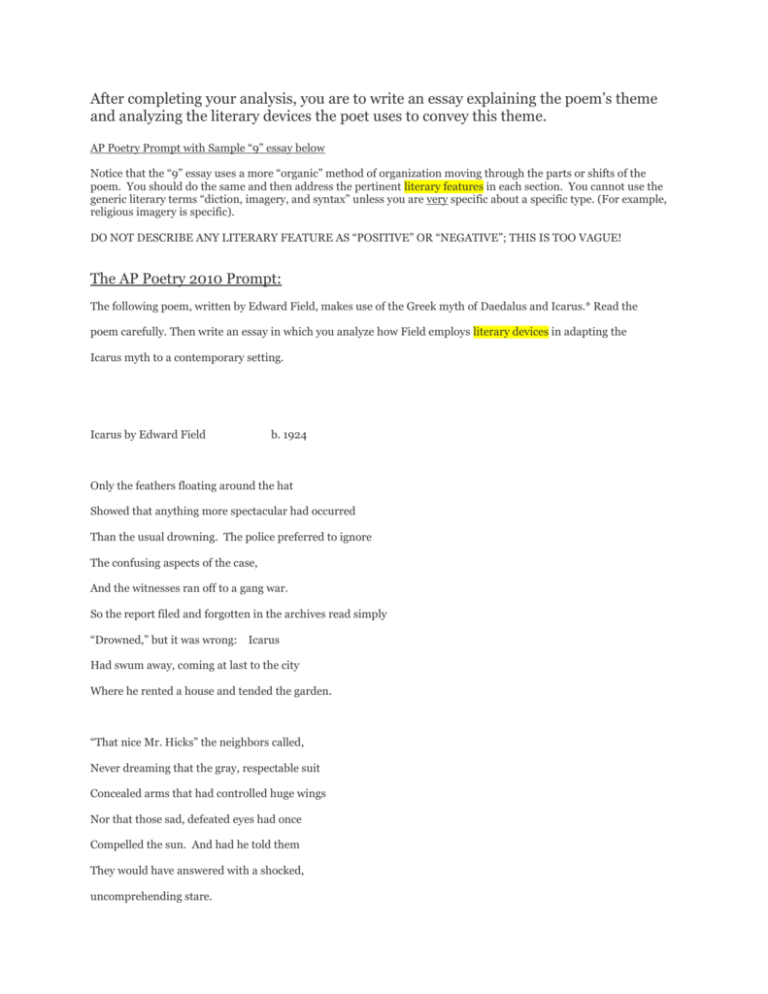
After completing your analysis, you are to write an essay explaining the poem’s theme and analyzing the literary devices the poet uses to convey this theme. AP Poetry Prompt with Sample “9” essay below Notice that the “9” essay uses a more “organic” method of organization moving through the parts or shifts of the poem. You should do the same and then address the pertinent literary features in each section. You cannot use the generic literary terms “diction, imagery, and syntax” unless you are very specific about a specific type. (For example, religious imagery is specific). DO NOT DESCRIBE ANY LITERARY FEATURE AS “POSITIVE” OR “NEGATIVE”; THIS IS TOO VAGUE! The AP Poetry 2010 Prompt: The following poem, written by Edward Field, makes use of the Greek myth of Daedalus and Icarus.* Read the poem carefully. Then write an essay in which you analyze how Field employs literary devices in adapting the Icarus myth to a contemporary setting. Icarus by Edward Field b. 1924 Only the feathers floating around the hat Showed that anything more spectacular had occurred Than the usual drowning. The police preferred to ignore The confusing aspects of the case, And the witnesses ran off to a gang war. So the report filed and forgotten in the archives read simply “Drowned,” but it was wrong: Icarus Had swum away, coming at last to the city Where he rented a house and tended the garden. “That nice Mr. Hicks” the neighbors called, Never dreaming that the gray, respectable suit Concealed arms that had controlled huge wings Nor that those sad, defeated eyes had once Compelled the sun. And had he told them They would have answered with a shocked, uncomprehending stare. No, he could not disturb their neat front yards; Yet all his books insisted that this was a horrible mistake: What was he doing aging in a suburb? Can the genius of the hero fall To the middling stature of the merely talented? And nightly Icarus probes his wound And daily in his workshop, curtains carefully drawn, Constructs small wings and tries to fly To the lighting fixture on the ceiling: Fails every time and hates himself for trying. He had thought himself a hero, had acted heroically, And dreamt of his fall, the tragic fall of the hero; But now rides commuter trains, Serves on various committees, And wishes he had drowned. Sample “9” essay released by College Board Modernity has certainly evolved from the time of the ancient Greece. However, the advancements in technology have not necessarily created a Utopian society. In “Icarus,” a poem by Edward Field, a mythological character is placed in the bustling and oxymoronic reality of the modern world. Figurative language, irony, syntax, and perspectives are essential elements of Field's relocation of Icarus, whose relocation exposes an alienating and unrelenting 20th century setting. Irony and contrast are immediately evident as Icarus's story unfolds in the second millennium of the common era. Beginning be depicting the setting and its inhabitants, the speaker highlights some oxymorons in current behavior. Witnesses to Icarus's mishap run off to a “gang war,” a cruel satire of urban life and ironical reversion of roles in just one line. Furthermore, Icarus's report at the police station is “filed and forgotten,” one element denying the purpose of the other. In addition to this, modern practices appear to contrast those of Icarus's original setting; in ancient Greece, tales were not written but sang, and they certainly weren't forgotten. Thus, though lacking mention to the protagonist, the first stanza subtly implies immediate differences between Icarus's traditional home and his new one. The second stanza begins with yet another juxtaposition of the original and the modified; while the foolish Icarus would have been deemed “disobedient” in his times, he becomes “nice Mr. Hicks” in modernity. As the speaker begins to describe Icarus directly, another allusion to modern tenets is made; Icarus's suit “concealed arms,” which we soon find out though that they are not the “arms” used in gang wars but those with which he attempted flight. Icarus's neighbors cannot perceive his sadness at the failure of his deed, though, and the gentle time (and air) traveler does not wish to upset them by revealing the truths. In this case, a metonymic [metonymy: referring to a part of something for a total idea; like “scepter” for “sovereignty”] “front yards” is used by the speaker to symbolize the suburban lifestyle and “moralistic” attitude of the people surrounding Icarus. In creating the final analogies and contrasts between the past and present Icaruses, the speaker draws into the tragic hero side of the protagonist and uses it in a rhetorical question at the end of the second stanza. Unfortunately for Icarus, it seems, he did not fall to his death but to the “middling stature of the merely talented”; he cannot find serenity in an environment where personal judgment (Icarus's neighbors) cannot reconcile with the group activities (participating in committees and riding commuter trains). Using anaphora [repetition at the beginning of lines], the first two lines of the third stanza convey Icarus's longing for tragic departure, juxtaposing nightly reflection and daily attempts at flight. Lacking the success he had in the past, even though it had cost him, Icarus comes to the conclusion that his role would have been much more satisfactory had he drowned. Field employs techniques of content (contrast and irony) and of how the content is shaped (anaphora and figurative language). In doing so, he conveys both poetically personal reflections and an effective change of Icarus's setting, shaping this work as an even more tragic story for the protagonist than his death in had been.
